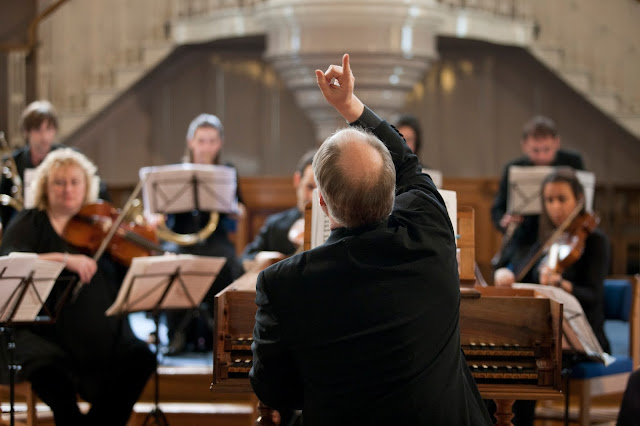 |
| John Butt & Dunedin Consort (Photo David Barbour) |
Bach's mass with just ten singers in a vibrant yet moving performance full of dramatic contrast
We don't know why or for whom Bach wrote his Mass in B minor, even the title is a later addition. A very, very late work, it is clear that he lavished a lot of care on it and essentially it is something of a summation of his art as he re-used carefully selected material from his back catalogue. That the piece works so well in its own right says a lot for Bach's sheer genius.
Not knowing the possible performance history leaves groups able to apply their own style to the piece, I have even sung it with a chorus of over 150 in Leeds Town Hall with the Victorian organ being used as continuo for the choruses! One concern that I always have in any performance is that of balance, you want moments like the fugue of the opening Kyrie to work with voices and instruments in equal balance so that when the voices come in the results are a continuation rather than the instruments accompanying the voices.
For the performance of Bach's Mass in B minor at the Wigmore Hall on Thursday 21 June 2018, John Butt and the Dunedin Consort used an ensemble of ten solo singers to perform the mass, along with an instrumental ensemble based on seven strings. Where some small-scale performances use all consort singers, Butt's line-up consisted of solo voices, Anna Dennis, Claire Evans, Ciara Hendrick, Emily Mitchell, Jess Dandy, Rory McCleery, Nicholas Mulroy, Thomas Hobbs, Matthias Helm and Jon Stainsby. The ensemble sound in the Coro was thrilling and vibrant, and this was a real vocal ensemble sound rather than a blended choral one. The results brought the piece alive in a way that purely choral ones rarely do, and the seamless transitions from 10-voiced ensembles, through one to a part ensemble to solos and duets, meant that the whole piece had a lovely consistency of tone.
The logistics were complex on a very full platform and I was impressed with the way both singers and orchestral players navigated the stage to get to the right places with the minimum of disruption, enabling the piece to flow naturally without the embarrassing waits for the correct ensemble to be in place.
The 'Kyrie' gave a clear idea of the stylistic world of the piece, with the strong sound from ten vibrant voices leading to a fugue where the individual voices were much more part of the fugal texture, and where each singer shaped and phrased beautifully. In all the ensembles there was a lovely sense of different voices coming into focus as their line became more important before receding. All was not strong, vibrant sound, the 'Christe' was duet from Anna Dennis and Ciara Hendrick was full of joyful bounce. This was a performance where contrast was important.
The sense of joy continued with the 'Gloria', which was one of the most uplifting accounts of this movement that I have heard. The sheer exuberance of the opening was wonderful, and despite the strong sound we could hear lots of details, leading to the more gentle 'Gratias'. Ciara Hendrick gave us joyful burbling in 'Laudamus te' (with a fine violin solo from Cecilia Bernardini), and Anna Dennis and Thomas Hobbs provided two vibrant yet balanced voices for an engaged, impulsive account of 'Domine Deus'. Some ensembles were performed with reduced numbers of singers, just one per part for four, five and six-part textures which gave intimacy and variety. Jess Dandy brought a lovely smooth tone to 'Qui sedes' whilst Matthias Helm was almost overshadowed by the vivid performances from Anneke Scott (horn), Phil Turbett and Joe Qiu (bassoons),
The opening of the 'Credo' was wonderfully forthright, and Anna Dennis and Jess Dandy gave a poised, full toned account of 'Et in unum Dominum Jesum Christum'. 'Et incarnatus est' with just five singers really brought out the suspensions, with the string texture keeping things moving, and this intensity continued with the 'Crucifixus' sung by just four voices. And then all ten exploded with 'Et resurrexit'. Thrilling! Matthias Helm was lyrical in 'Et in Spiritum Sanctum' complemented with a lovely pair of duetting oboes. Single voices sang the 'Confiteor' providing superb contrast with the final full-voiced fugue.
The 'Sanctus' had great contrast between the flowing lines and the strong punctuations, and then 'Pleni sunt coeli' went with a wonderful swing. Nicholas Mulroy was the soloist in the 'Benedictus', singing the long lines with a vibrant, lyric voice beautifully complemented by the flute solo. For the 'Agnus Dei' Jess Dondy sang with expressive plangent tone, making much of the long unfolding lines, with the concluding chorus making a powerful conclusion to vibrantly moving account of this work.
Elsewhere on this blog:
- Brilliant ensemble: Cole Porter's Kiss me Kate from Opera North (★★★★½) - music theatre review
- ‘A well-regulated church music’ - John Eliot Gardiner at the Bach Weekend at the Barbican (★★★★) - concert review
- Humanity & warmth - Solomon's Knot at the Bach Weekend at the Barbican (★★★★½) - concert review
- Handel Sonatas for violin and basso continuo (★★★★★) - CD review
- Engaging rarity: Verdi's Un giorno di regno from Heidenheim (★★★★) - CD review
- Rossini's Il barbiere di Siviglia at The Grange Festival (★★★★) - Opera review
- Seriously unusual: Stephen Barlow introduces Buxton Festival's production of Verdi's Alzira - interview
- Second View: Mozart's Cosi fan tutte at Opera Holland Park conducted by George Jackson (★★★★) - opera review
- Sei solo: Bach's partitas and sonatas for violin alone from Thomas Bowles (★★★½) - CD review
- Io la Musica son: Francesca Aspromonte in Prologue (★★★★★) - CD review
- Home











No comments:
Post a Comment